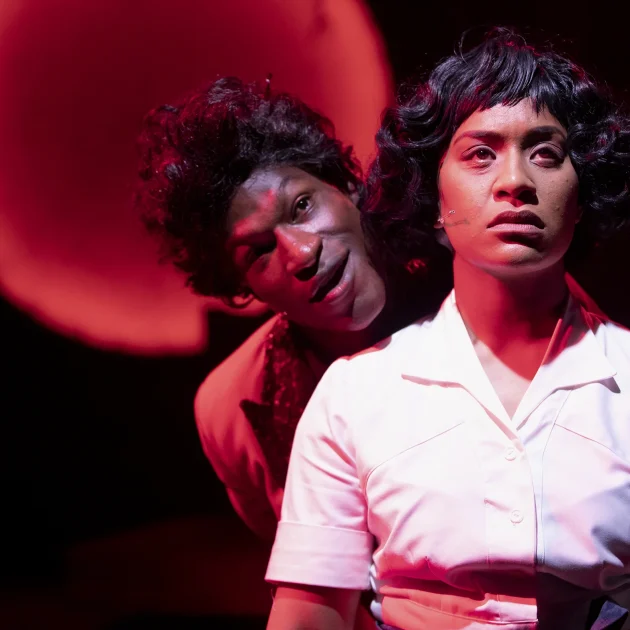
Caroline, or Change
CAROLINE, OR CHANGE, is a work, an autobiographical work from Tony Kushner. He is famous for ANGELS IN AMERICA (1993) – maybe, as well, for the screenplay of LINCOLN (2012). Born in Manhattan, his family moved to Lake Charles, Louisiana, when he was a young boy. He wanted to write about race relations, the civil rights movement, African Americans and Southern Jews in the early 1960’s.
This play comes from sorrow, from anger and grief, and also from hope learned from history, from recent history, which has shown us both the terrors and also the pleasures of change, which shows that change, progress is difficult, uneven, uncertain, but also absolutely possible.
The two principal antagonists are Caroline Thibodeaux, an African-American maid working in the Gellman household, and 13 year old Noah, the son of this Jewish family, living in Lake Charles, in 1963, both growing and challenged in a world that is demanding change.
ANGELS IN AMERICA is a landmark play that is still celebrated and contemporaneously performed at regular intervals. That work holds a fascination and level of satisfaction like almost no other play in recent history. And though all of Kushner’s output is remarkable, nothing has quite achieved the greatness of that play, is my observation. So, how does CAROLINE, OR CHANGE fit?
CAROLINE, OR CHANGE, is a musical written over four years of intensive work and first produced in 2002, with Jeanine Tesori as composer. The Hayes produced VIOLET, her 1997 OFF-BROADWAY musical and I recently caught her work FUN HOME on Broadway, which won the Tony Award for Best Original Score in 2015. This production of CAROLINE, OR CHANGE, Directed by Mitchell Butel, is the first iteration of this work in Australia. One, I, have hung out to see over the years for many reasons, the least of which was to make contextual valuations of the quality of the writing of this work. ANGELS is so intensely, brilliantly confronting in its political aspirations, but is, also, entertaining.
CAROLINE, OR CHANGE, is an intense observation of the pressure-cooker challenge of the 1960’s for an older fashioned African-American woman bringing up her young family as a single parent in times of sweeping political debate and strivings for civil rights, and whether she can afford to change. She must be able to ensure the economic stability of her family. Although Caroline understands the unconscious racism of her employers she makes a choice to endure it for safety’s sake, and struggles to maintain her submission in the argumentative heat blast of her ‘liberated’ daughter, Emmie’s beliefs. Caroline may agree with her daughter but can she afford to do anything about it?
It, also, reveals the struggle of a 13 year old pubescent boy, a Jewish boy, in the midst of great physical and philosophical change, facing the challenge of growth from boy to man and the navigation of the necessary adjustments he may need to make to maintain respect for himself and his actions (this is the Kushner autobiographical reveal) especially, towards his ‘friend’ Caroline – “Just what is the value of a $20 bill in the great scheme of things?”
The writing work is complex and relentless. It is naturalistic but also surreal (the Moon sings to us), it sits at a great time-hinge of a societal political change, both communal and yet, still, domestic, sung-through in an operetta style. (I kept re-calling the passion of the Aretha Franklin documentary: AMAZING GRACE).
Mr Butel has found an actor/singer, Elenoa Rokobaro, to inhabit the difficult role of Caroline, and almost coaches her to assurance. Her performance crystallises in the second act with a wonderfully committed rendition of ‘Lot’s Wife’ that moves one gratefully, this having been prepared for with the contribution of Nkechi Anele during the pressure-cooker demands of Emmie in the second act. In fact, the second act is when this musical began to realise its spectacular potential. It was when Amy Hack as Rosie Stopnick-Gellman supported by Tony Llewellyn-Jones as Mr Stopnick blossomed into power, as well.
The Set Design is crowded with the demands of the writing and yet fulfils its needs with visual grace by Simon Greer, and the Lighting of Alexander Berlage. Choreographically the stage is relatively cramped and Yvette Lee has a company of ‘dancers’ of varying ability to coalesce as an ensemble (although the multiple-role casting, requiring swift dexterity in Costume change (Melanie Liertz) by the company, might be solved with the repetition of performance – I saw this production in first preview). Musically, the show is in steady hands under the Direction of Lucy Birmingham with a live orchestra of six. The Sound mix is complicated (Anthony Lorenz) and, as yet, not absolutely balanced.
CAROLINE, OR CHANGE, is definitely a must see for Kushner and Tesori fans. Now, I need to hunt down Kushner’s THE INTELLIGENT HOMOSEXUAL’S GUIDE TO CAPITALISM AND SOCIALISM WITH THE KEYS TO THE SCRIPTURES, and I might die satisfied and happy.
P.S. The Company includes:Alexandra Fricot, Andrew Cutcliffe, Daniel Harris or Ryan Yeates, Elijah Williams, Emily Havea, Genevieve Lemon, Ruva.